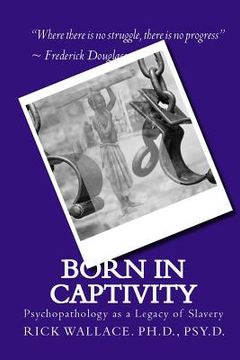Reseña del libro "Born in Captivity: Psychopathology as a Legacy of Slavery (en Inglés)"
Born in Captivity is my 19th book to reach publication, and it is also the most in-depth and comprehensive book thus far. It is a reflection of the more than 50,000 hours of research conducted over the last 20 plus years. In this book, I confront the darkness that is normally avoided at all cost - psychopathology as a legacy of slavery.With the intergenerational transmission of trauma as a root problem in African American behavior, I endeavored to unwrap origin, causality, perpetuation and resolution. I confront relational a familial issues, inferiority complexes, consumerism, disunity, how we view and treat property, incest, rape and other forms of CSA, as well as religious influences on social mobility and functionality. As is my philosophy, it did not stop with identifying the origins and causes but continued in the intense work of facilitating repair and healing.Born in Captivity: Psychopathology as a Legacy of Slavery (The Answers)Have you ever asked yourself:1. Why we behave the way we do?2. Why we can't escape poverty as a collective?3. While having all the blueprints and strategies necessary for advancement, why haven't we advance in 152 years of quasi- freedom!4. What destroyed our families?5. Why are our men and women at odd?And more...I give you the answers to those questions and much more in Born in Captivity: Psychopathology as a Legacy of SlaveryIt started for me more than 30 years ago when I watch Dr. Francis Cress Welsing on the Phil Donahue Show. Dr. Welsing was defending her dissertation, The Cress Theory of Color Confrontation amidst a great deal of credulous resistance and hostility, yet she was holding her own. This was significant to me because the ideology of Black intellectual inferiority was just several years in the rear view of American consciousness and here was this Black woman dominating an intellectual forum.It was my pursuit and study of Dr. Welsing's work that I discovered Neely Fuller Jr., Dr. Amos Wilson, Dr. John Henrik Clarke, Dr. Yosef Ben Yochanan, Dr. Na'im Akbar, Dr. Claud Anderson and many more. In reviewing everything that these teachers were presenting, it was evident that we had the blueprint for Black elevation and empowerment; however, we had not made any progress since we received our quasi-freedom in 1865.It became my quest to gain a lucid and comprehensive perspicacity of why we could not progress despite having all of the answers before us and while the answer is immensely complicated in dynamic it is easily expressed in the terms of our reality - we are perpetuating psychopathological behavior as such as rate and intensity that we have embraced this erroneous behavior as a part of our culture.The counterintuitive and nonconducive behavior we perpetuate constantly works to create a cyclical dynamic that further exacerbates our current condition. We are still dealing with the legacy of slavery because we never healed from its wounds, and we have been consistently re-injured along our journey in the country.Incest and other forms childhood sexual abuse can be traced back to slavery. The silent condonation that accompanies this type of behavior can also be traced back to slavery. The inability of Black males to properly bond with their progeny and sustain healthy marital relationships can be traced back to slavery. The manner in which we view "property" (Some of us can't help but destroy it and others lust for it creating a mindset of consumerism) and material objects can be traced back to slavery. I could go on and on speaking of behaviors that that function in direct opposition of what we say we want the most - absolutely liberation and empowerment.Born in Captivity is the "The Answer" to all of the questions associated with the enigmatic issues we face. It is it the beginning of the recovery and restorative process. I invite to be a part of this journey toward Black empowerment! Rick Wallace, Ph.D., Psy.D.

